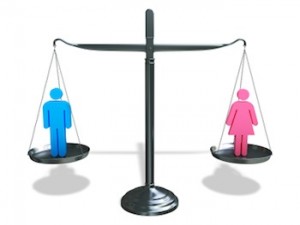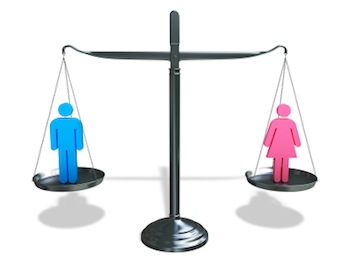 Rhode Island NOW is proud to be a sponsor of the She Said He Said campaign along with Women’s Fund of Rhode Island to start and continue the conversation on gender bias in the media. During the campaign kickoff event, Celinda Lake, President of Lake Research Partners, presented research on the damaging effects of media sexism and the impact it has on female candidates and their vote count.
Rhode Island NOW is proud to be a sponsor of the She Said He Said campaign along with Women’s Fund of Rhode Island to start and continue the conversation on gender bias in the media. During the campaign kickoff event, Celinda Lake, President of Lake Research Partners, presented research on the damaging effects of media sexism and the impact it has on female candidates and their vote count.
Here are what we see as critical takeaways from her research:
- Initially, after given a neutral profile of both a female candidate and male candidate, voters were more likely to say they would vote for the woman.
- Even mild sexist language has an impact on voters’ likelihood to vote for a female candidate and on how favorably they feel toward the woman seeking office.
- Neutral, positive, and negative descriptions of the female candidate’s appearance all had detrimental impacts on her candidacy.
- The impact of sexism can be diminished by a strong, immediate response from a female candidate or third party validator.
We can help combat the harmful effects of media sexism by speaking up and speaking out. Who’s we? All of us, voters, advocates, and the candidates themselves—we must speak up when we see sexism and redirect the conversation back to the issues.
What is sexist media? Here are a few examples from She Should Run:
Jean Stothert, Mayor of Omaha
As the only woman in the race, Stothert experienced severe sexism, most notably from a fellow City Council member. The Councilman was photographed wearing a shirt that featured an illustration of Stothert in a bikini, on a stripper pole, with the words “Jean, quit stripping…off our tax dollars” and “sponsored by: suck my private sector.” Classy. She fought back, stating, “It’s not only demeaning to me, it’s demeaning to women.” She is now the first woman Mayor of Omaha and proof that addressing sexism head-on can turn out positive results.
Jenifer Rajkumar, 2013 Candidate for New York City Council
In an article critiquing Rajkumar’s nonprofit experience, the New York Post ran the headline, “This over-achieving beauty is running for City Council as head of non-profit that’s only skin deep.” This subtle form of sexism focuses on her appearance, specifically her “beauty,” which diminishes her credibility as a candidate by evoking unfavorable gender stereotypes instead of focusing on substantive issues. Even subtle forms of sexism must be addressed.
Elizabeth Warren, U.S. Senator from Massachusetts
Since February 2012, Warren has been battling sexist coverage by the Boston Herald. Name It. Change It. declared, “No other mainstream media outlet has shown Warren such disrespect as a woman running for office. Whether the editorial page of this paper is mocking her age by calling her “granny” or belittling her by calling her Liz or Lizzie, it has become clear that The Boston Herald cannot stray from utilizing sexist vocabulary when writing about Elizabeth Warren even after being called out for it.”
For more examples of sexist media coverage check out NameItChangeIt.org, a nonpartisan joint project of the Women’s Media Center and She Should Run.
Looking Ahead
“One has to consider whether sexist media coverage contributes to the low participation of women in Rhode Island politics,” stated GoLocalProv reporter Kate Nagle at a recent forum on sexism and the media.
Women still only make up make 27 percent of the General Assembly, and few women have run and achieved statewide office. But the picture is not completely bleak. We are making strides. Senate President Teresa Paiva-Weed broke the glass ceiling in 2008 when she became the first female Senate President in Rhode Island history. Several women have already thrown their hats into the ring for statewide office; Gina Raimondo is hoping to become Rhode Island’s first female Governor and Nellie Gorbea is seeking the office of Secretary of State.
There are also many women who will be seeking election and reelection in city council and school board races across the state as well as the General Assembly. Several female General Assembly members already know they will be facing challengers to win back their seats. Whether you’re undecided, opposed or supportive of these candidates it is on all of us to defend these women should issues of sexism arise. If they are brave enough to seek elected office, then we should be brave enough to speak up when they are unjustly attacked based on gender.
As the 2014 election cycle heats up in Rhode Island, it is important to remember that the media is a reflection of society. Collectively—with force—we can influence the conversation. Celinda’s research found that even mild forms of sexism can hurt female candidates. She also found that sexism hurts all candidates, not just the women they may be targeting. So it is on all of us, men and women, to be third party validators against sexism in the media and return the conversation to the issues. After all, isn’t our economic future and education system too important to be derailed by sexist bylines?
I hope you will join Women’s Fund of Rhode Island and the members of Rhode Island NOW in becoming third party validators, because the cost of being a bystander is just too high. Be sure to join the conversation on Twitter, check out @WomensFundRI @RhodeIsland_NOW #shesaidhesaidri. We look forward to engaging with you!
Amanda Clarke, the author of this post, is Chair of Education and Outreach for the Rhode Island chapter of the National Organization for Women.

